 Petzlover
Petzlover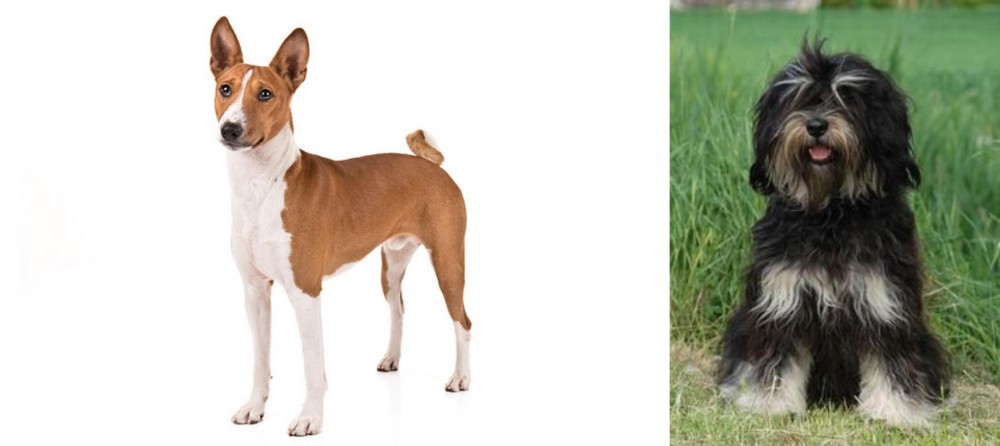 Basenji is originated from Congo but Cao da Serra de Aires is originated from Portugal. Basenji may grow 12 cm / 4 inches shorter than Cao da Serra de Aires. Basenji may weigh 14 kg / 30 pounds lesser than Cao da Serra de Aires. Both Basenji and Cao da Serra de Aires has same life span. Both Basenji and Cao da Serra de Aires has almost same litter size. Basenji requires Low Maintenance. But Cao da Serra de Aires requires Moderate Maintenance
Basenji is originated from Congo but Cao da Serra de Aires is originated from Portugal. Basenji may grow 12 cm / 4 inches shorter than Cao da Serra de Aires. Basenji may weigh 14 kg / 30 pounds lesser than Cao da Serra de Aires. Both Basenji and Cao da Serra de Aires has same life span. Both Basenji and Cao da Serra de Aires has almost same litter size. Basenji requires Low Maintenance. But Cao da Serra de Aires requires Moderate Maintenance
 The Basenji is an old breeds of domesticated dog and the dog was discovered by Westerners in the Congo region of West Africa in the 19th century. The word ‘Basenji’ means ‘dog of the bush’ the Congo area of Africa. The Basenji falls into the hound category as a hunting dog.
The Basenji is an old breeds of domesticated dog and the dog was discovered by Westerners in the Congo region of West Africa in the 19th century. The word ‘Basenji’ means ‘dog of the bush’ the Congo area of Africa. The Basenji falls into the hound category as a hunting dog.
The dogs were first imported into England and the United States in the 1930s.The Basenji Club of America was started in 1942, and the American Kennel Club recognized the breed in 1943. The new additions also introduced the brindle color pattern to the Western Basenji.
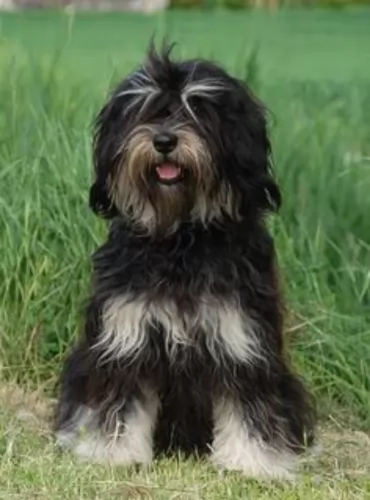 Ancestors of the Cao da Sera de Aires were used for herding livestock in the Serra de Aires and Alentejo, Portugal. This herding dog is native to Portugal and throughout the 20th Century he was kept as a working dog.
Ancestors of the Cao da Sera de Aires were used for herding livestock in the Serra de Aires and Alentejo, Portugal. This herding dog is native to Portugal and throughout the 20th Century he was kept as a working dog.
Known also as the Portuguese Sheepdog, Portuguese Shepherd Dog or Serra de Aires Mountain Dog, there are some questions surrounding the breed's ancestry as there are few records of dogs before 1900. The dog is thought to be related to the Pyrenean and Catalan Sheepdogs and that it has descended from Briards which were imported into Portugal and crossed with the Pyrenean Sheepdog.
The Cão da Serra de Aires breed standard was accepted by the Portuguese Kennel Club, and the breed was recognized internationally in 1996. The dog was also recognized by the United Kennel Club in the Herding Group in 2006.
 Described as being catlike, this is an unusual dog to say the least. The reason for this is that he doesn’t have a bark but rather emits a characteristic noise which is likened to a chortel and a yodel. The Basenji is a medium sized dog but he isn’t robust looking. He is a lightly built dog of 40 – 43cm in height and his coat is short and sleek. He has long legs which help with being quick and agile and his shortish tail curls over his back and he has naturally upright ears.
Described as being catlike, this is an unusual dog to say the least. The reason for this is that he doesn’t have a bark but rather emits a characteristic noise which is likened to a chortel and a yodel. The Basenji is a medium sized dog but he isn’t robust looking. He is a lightly built dog of 40 – 43cm in height and his coat is short and sleek. He has long legs which help with being quick and agile and his shortish tail curls over his back and he has naturally upright ears.
As we’ve said, this is an unusual dog, and his wrinkled head gives the dog a quizzical expression. Another strange feature is that not only is this dog breed looked upon as being somewhat primitive, the odd thing about these dogs is that the female only comes into heat once a year. Another somewhat unusual aspect of this self-confident, friendly dog is that unlike other dogs which have a typical dog odour, this canine is odourless, making him a particularly excellent household pet.
His coat comes in different colors and this can be red and white, tan, tan and white as well as black and white or tri-color. These particular dogs are well known for their excellent eyesight and their excellent sense of smell.
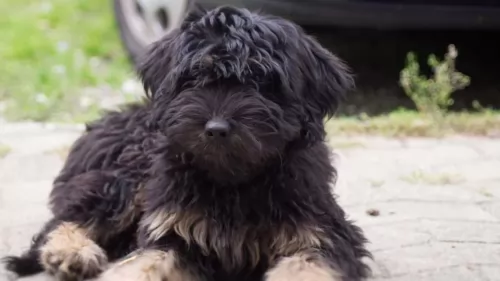 The beautiful Cão da Serra de Aires is a medium-sized dog. He stands at 45 to 55 cm at the withers and weighs about 17 to 27 kg. He is recognizable by the long, shaggy, single-layer coat, of straight or slightly wavy hair. Don’t be deceived by the coat as below, the dog has a muscular, athletic body.
The beautiful Cão da Serra de Aires is a medium-sized dog. He stands at 45 to 55 cm at the withers and weighs about 17 to 27 kg. He is recognizable by the long, shaggy, single-layer coat, of straight or slightly wavy hair. Don’t be deceived by the coat as below, the dog has a muscular, athletic body.
The coat comes in different shades such as fawn, gray, yellow and black. The dog has a long tail which is held straight out or down and he has medium-length, floppy ears. You’ve got to look hard, as the facial features of the dog are hidden by its shaggy coat. He has a lot of facial hair that sometimes you have to wonder if he can see out of his eyes.
The Cao da Serra de Aires is a wonderful canine companion and is devoted and loyal, forming strong bonds with their human family. He is a playful, amicable dog and gets on well with children in the home as well as with other pets.
He is intelligent and trainable, and when properly trained and socialized,he becomes an even nicer pet to have around and is obedient to his master’s voice. He is territorial, strong willed and dominant and makes a good watchdog too.
 The Basenji is an affectionate dog with his family, but he doesn’t take kindly to strangers. If he is socialized when young, he’ll be fairly friendly with other pets in the family too. The Basenji is an intelligent dog but not particularly easy to train, and will require patience as he has a will of his own.
The Basenji is an affectionate dog with his family, but he doesn’t take kindly to strangers. If he is socialized when young, he’ll be fairly friendly with other pets in the family too. The Basenji is an intelligent dog but not particularly easy to train, and will require patience as he has a will of his own.
These short-haired dogs are clean-living with grooming habits similar to a cat. They shed just a little too. They love their human family and will make a good watchdog because they are courageous dogs, ready to defend what they love.
This is an unusual dog, and not everyone will appreciate him as a pet as he is independent, obstinate and determined to do his own thing. If you’re a single person or a family who spends a lot of time outdoors hiking, swimming and hunting – then the Basenji can make an affectionate devoted, loyal companion.
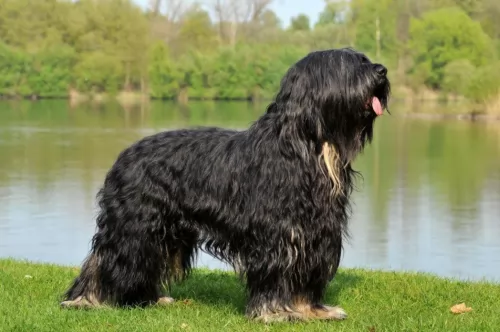 The Cão da Serra de Aires is such a loyal dog to his human family that he makes a splendid pet. He is active, having worked historically at herding and guarding.
The Cão da Serra de Aires is such a loyal dog to his human family that he makes a splendid pet. He is active, having worked historically at herding and guarding.
Socialization and obedience training ensure that he becomes an exceptional pet and he has a host of positive attributes to his name – he is intelligent, energetic, loyal and loving. He may have been used long ago to guard livestock, but today he is selected as a pet specifically for his excellent companionship and for his protective nature.
 Basenji are generally healthy dogs. As with most other canines, these dogs are also prone to health disorders such as canine hip dysplasia. Check your Basenji for hereditary eye diseases which can lead to blindness.
Basenji are generally healthy dogs. As with most other canines, these dogs are also prone to health disorders such as canine hip dysplasia. Check your Basenji for hereditary eye diseases which can lead to blindness.
This is a kidney disease where your pet will urinate out the protein he so badly needs. He’ll be excessively thirsty and the disease mostly sets in from 4 years of age. It is an inherited kidney disease which can be fatal.
Many health problems can be partially- or totally prevented by the way you raise your puppy, and the lifestyle you provide him with. By doing everything you can to give him good food, a dry, warm space to sleep, lots of activities and exercise and plenty of love and attention, you’ll have less health problems.
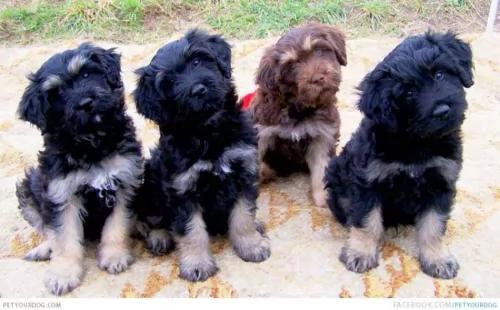 As with most dogs that are looked after well, their health can be good. The Cao da Serra de Aires isn’t likely to keep you at the vet often. Just like with any good dog, there are some health disorders that can benefit you to know about.
As with most dogs that are looked after well, their health can be good. The Cao da Serra de Aires isn’t likely to keep you at the vet often. Just like with any good dog, there are some health disorders that can benefit you to know about.
Being forewarned , you can get your pet to the vet quickly before the illness gets out of hand.
There are some pet owners who want to have their pets tested by the Orthopedic Foundation for Animals as well as the Canine Eye Registration Foundation to rule out health defects such as hip dysplasia and cataracts before they manifest themselves in their pets. This is of particular importance to breeders so as to prevent the parent dogs passing bad genetic conditions to the puppies.
This is a common skeletal disease where the dog’s hip joints don’t develop properly. It can be terribly painful for your pet to get around. It’s a genetic condition and while it is more prevalent in big dogs, any breeds are susceptible.
Your dog will battle along with painful joints and sometimes his hind-end will be lame. You’ll notice that once lying down, he battles to get up again. Fortunately vets are well acquainted with this ailment and they have different options to treat and manage it.
Cataracts in your dog come about from a disease process which affects the lens of the eye. The eye loses its transparency and impairs vision. There are some instances where cataracts can cause blindness. You’ll see a whitish gray area in your pets eye. The most common cause of cataracts is genetics. Get your pet to the vet who will do certain tests to evaluate the eyes and make a recommendation.
 Basenjis are fastidious – much like a cat, and they like to be licking at their coats to keep themselves clean. They have a short coat, and this will need to be brushed once or twice a week to get rid of loose hairs and to also stimulated skin oils throughout the coat to keep it shiny and glossy.
Basenjis are fastidious – much like a cat, and they like to be licking at their coats to keep themselves clean. They have a short coat, and this will need to be brushed once or twice a week to get rid of loose hairs and to also stimulated skin oils throughout the coat to keep it shiny and glossy.
As with all dog breeds, the Basenji‘s ears should be checked over and his nails regularly trimmed.
The Basenji needs high quality dog food, regardless of whether you food him commercially manufactured foods or you make your own. If you aren’t sure about how to feed a dog properly to maintain good health, speak to your veterinarian. Dog food needs to be appropriate to the dog’s age and his breed type. Certainly it can be wise to learn what human foods can be dangerous for your dog. Clean, fresh water from bowls which are regularly cleaned should be accessible at all times.
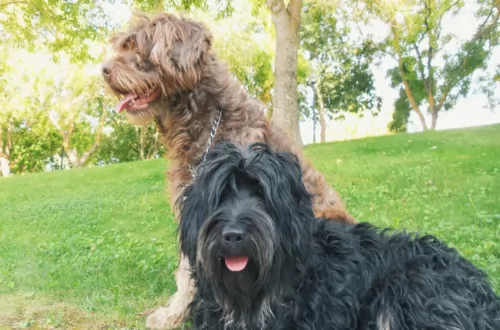 As a working dog used to long hours of action, the Cao da Serra de Aires will need lots of activity. He’ll need you taking him for long walks and playing ball games with him. He can become frustrated and destructive when left without any physical stimulation.
As a working dog used to long hours of action, the Cao da Serra de Aires will need lots of activity. He’ll need you taking him for long walks and playing ball games with him. He can become frustrated and destructive when left without any physical stimulation.
The Cao da Serra de Aires may have long hair but he isn’t high maintenance. He won’t require professional grooming, but will require a good brush a least twice a week. This is because the long coat can tangle.
To keep him looking his best, you’ll want to be trimming the hair around his paws. Another important grooming task is checking his ears and cleaning them. You have to be careful about cleaning your pet ears if you don’t know how, as it could damage the ears. Your vet can always advise you on how this is done.